It’s easy to forget that Manchester United finished second in the Premier League last season. They never looked like a second place team. They were never engaged in a serious title challenge to Manchester City. Their numbers didn’t support their 81 point haul. Throw in a disappointing round of 16 loss to Sevilla in the Champions League and that second place finish seems like the bow on top of a very unpleasant smelling sandwich of a season. The scary thing for United is that with a new season about to kick off, the sandwich remains unchanged.
A One Man Defense
Jose Mourinho teams have historically been renowned for their defensive excellence. The most cursory of glances might suggest this team was similar. After all, they only gave up 28 goals last season. That was the second fewest in the Premier League and only one more than Manchester City. With a defensive record like that, the natural thing to assume would be that Mourinho was plugging away like his normal old self, building a team assured in defense but perhaps too conservative in attack. That couldn’t be further from the truth. United’s stingy defensive record is almost entirely the responsibility of one man. David De Gea. The United goalkeeper singlehandedly upheld a team that was actually fairly porous. Despite being within a goal of the best defensive record, United conceded 1.12 expected goals per game, only the fifth best tally in the league. They trailed not only crosstown rivals Manchester City but also Chelsea, Liverpool, and Tottenham. The difference between the actual goals conceded and the expected goals conceded rests heavily on De Gea’s shoulders. It would be one thing if United opponents just forgot how to shoot last season. If, for some reason whenever they had a clear look on goal they just ballooned it over the bar. But that’s not what happened. De Gea, instead, stood on his head and turned a number of brilliant goal scoring opportunities into saves.
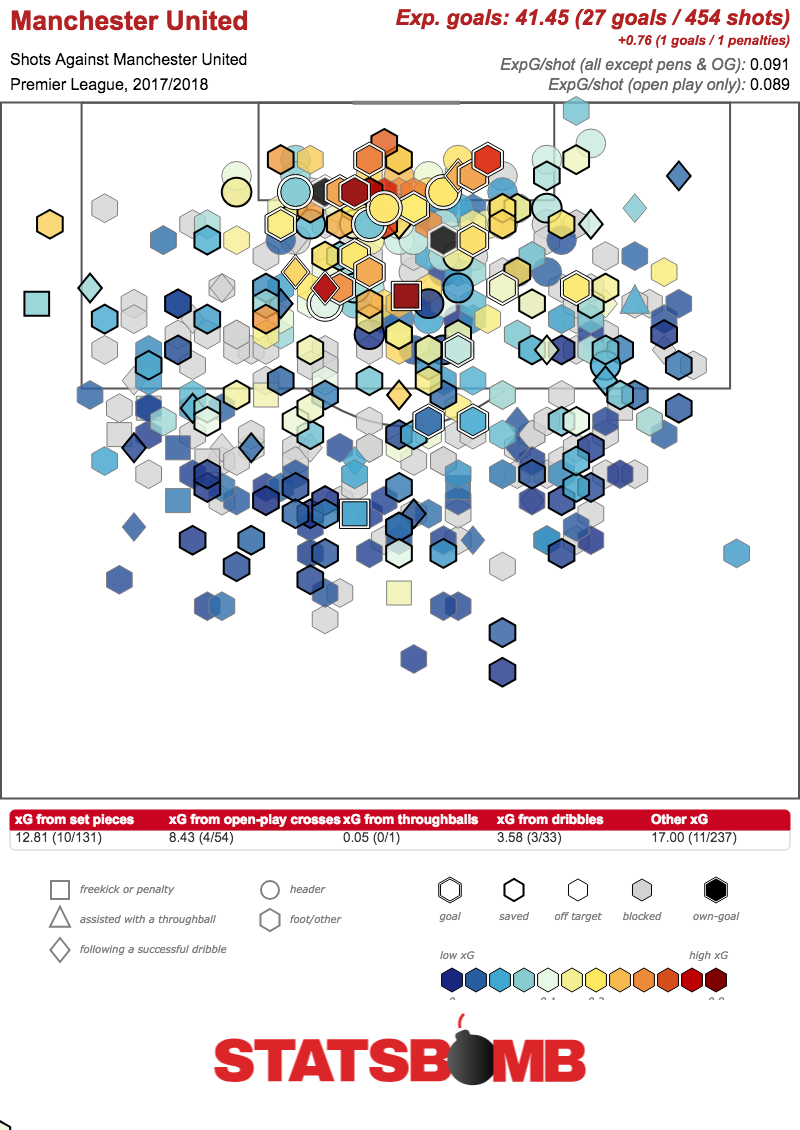
It’s not exactly breaking new ground to proclaim De Gea’s brilliance. Nor is it controversial to say that despite being perhaps the best goalkeeper currently wearing gloves it’s extremely unlikely that he’ll have the same type of season again. What’s more pressing is understanding exactly what went wrong with United that caused De Gea to be so incredibly busy in the first place. The answer isn’t exciting. Manchester United simply conceded too many shots. United, as a side, were happy not to be extremely possession oriented. Mourinho’s long standing preference for shape and discipline over aggressively winning the ball back was apparent. They just weren’t good enough at it. An important thing to understand about Mourinho’s approach to defending is that it’s not passive. His teams while being defensively conservative are also interested in harrying teams up and down the field. Forwards and midfielders are supposed to drop behind the ball, but then step up and pressure opposition in front of them. This isn’t revolutionary, of course, it’s basic defending. The idea is that the team moves as a unit, staying vertically compact, when forwards step forward, midfielders do as well, with defenders pushing up in turn. Each line stays goal side of the opposition they’re responsible for, but doesn’t give them space to operate when they have the ball. It results in pressuring opposition all over the place. Here are United’s defensive actions.
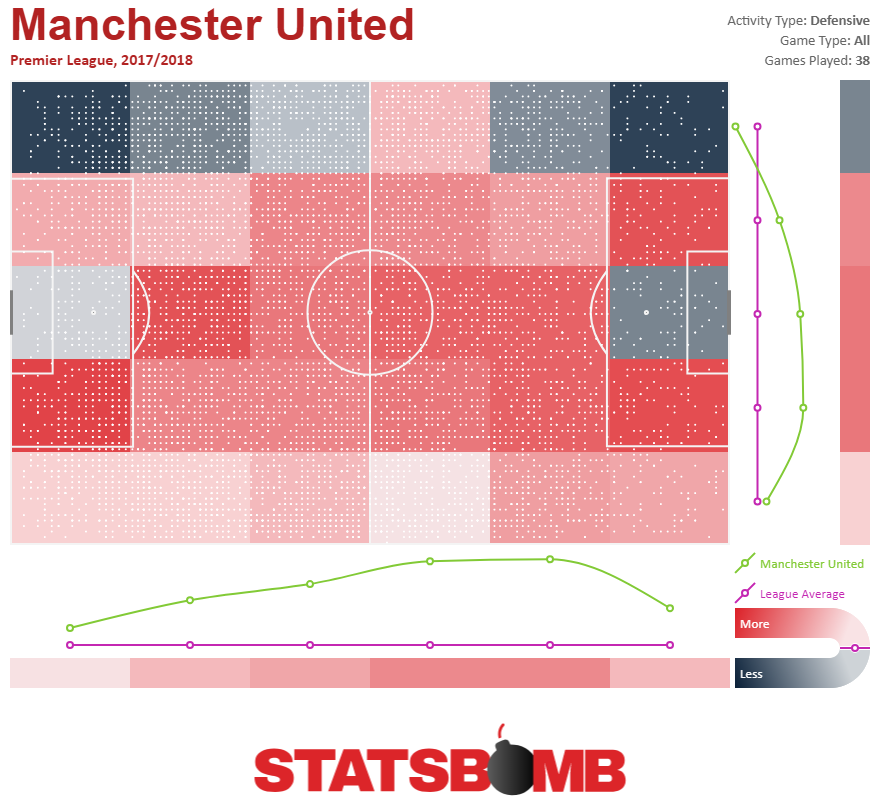
The problem for United is that they weren’t actually able to turn those defensive actions into changes of possession. Take away the pressures, and look only at a combination of fouls, tackles, interceptions, blocked shots and passes, and what you find is a team with a very soft underbelly.

Opposition that could handle the pressure in their own half were able to attack the middle of the pitch with relative ease, and while they might have been pressured while doing so, United were simply unable to take the ball away. The result was that United just conceded way too many shots, even allowing for the fact that most of them were low quality. They gave up 11.89 shots per game, only the seventh fewest in the league last season. That’s simply not good enough. It’s especially not good enough for a team that is intent on pressuring opposition all over the field, even if that pressure is designed to work while keeping a conservative shape. In order for United not to concede significantly more goals than last season they’re going to need to cut down on the frequency that their opponents are able to beat defensive pressure in the middle of the pitch, maintain possession and turn that possession into shots. Part of the solution might rest in upgrading their center backs, and would explain why they’ve reportedly expressed serious interest in both Toby Alderweireld and Harry Maguire. Perhaps nothing summarizes the United problem more than the regular occurrence of Phil Jones charging headlong out of defense, to pressure a striker receiving an out ball, getting there late, and then frantically struggling to recover as United’s structure crumbles around him thanks to his mistake.
A Mediocre Attack
United’s defensive issues might be excusable if they led to an audacious attack. It would be an understandable trade to make. Leverage De Gea’s amazing season, give him less protection, and in turn focus on battering the opposition by pouring numbers forward. That’s not at all what happened though. As the season progressed, United instead became noticeably more conservative. As he attempted to solve the persistent defensive problems, Mourinho increasingly clamped down on his team’s freedom. Looking at a five game rolling average it’s clear to see how United’s attack became less potent, but that didn’t solve the defense’s problems. 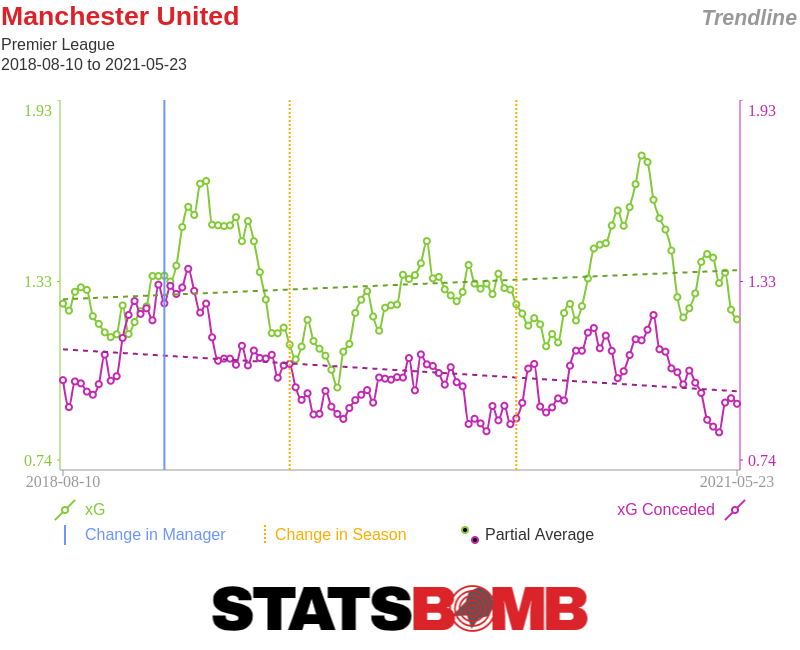 That change happened despite adding Alexis Sanchez. The Sanchez acquisition certainly made headlines both for the exorbitant wages they were reported to be paying a 29 year old entering the twilight of his prime and for the fact that it blocked Anthony Martial and Marcus Rashford’s progress. But, what might be even more important is that it changed the balance of United’s attack. Both Martial and Rashford interpreted their role on the wing as that of a second striker. Their defensive responsibilities might be out wide, and they might be attacking the goal from an angle, but both players wanted to get into the box, receive the ball and try and make stuff happen. Only striker Romelu Lukaku had more touches in the box per 90 than the two hybrids.
That change happened despite adding Alexis Sanchez. The Sanchez acquisition certainly made headlines both for the exorbitant wages they were reported to be paying a 29 year old entering the twilight of his prime and for the fact that it blocked Anthony Martial and Marcus Rashford’s progress. But, what might be even more important is that it changed the balance of United’s attack. Both Martial and Rashford interpreted their role on the wing as that of a second striker. Their defensive responsibilities might be out wide, and they might be attacking the goal from an angle, but both players wanted to get into the box, receive the ball and try and make stuff happen. Only striker Romelu Lukaku had more touches in the box per 90 than the two hybrids. 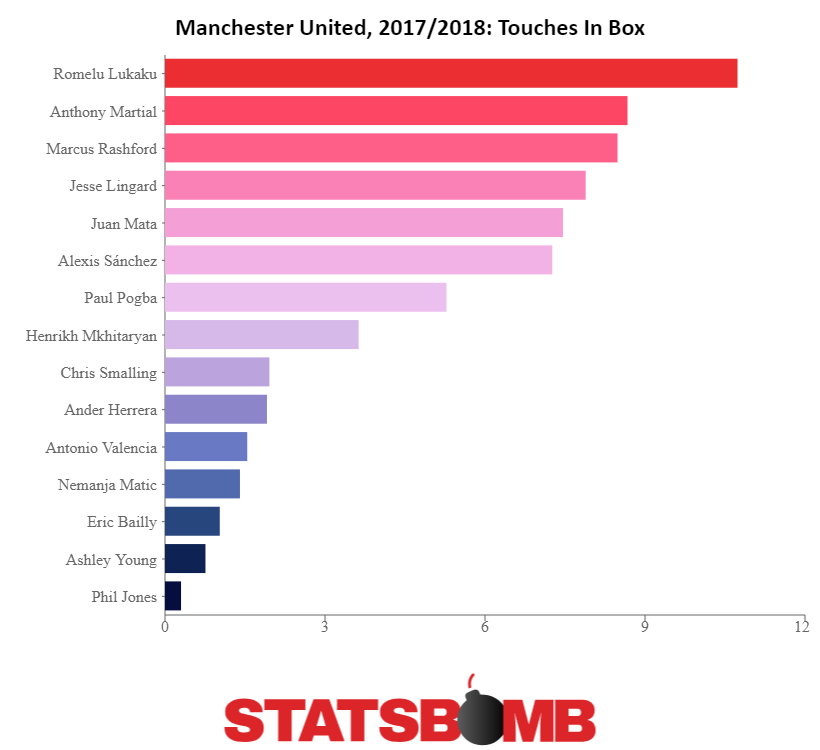
And again, only Lukaku had a higher percentage of his touches be shots than those two. 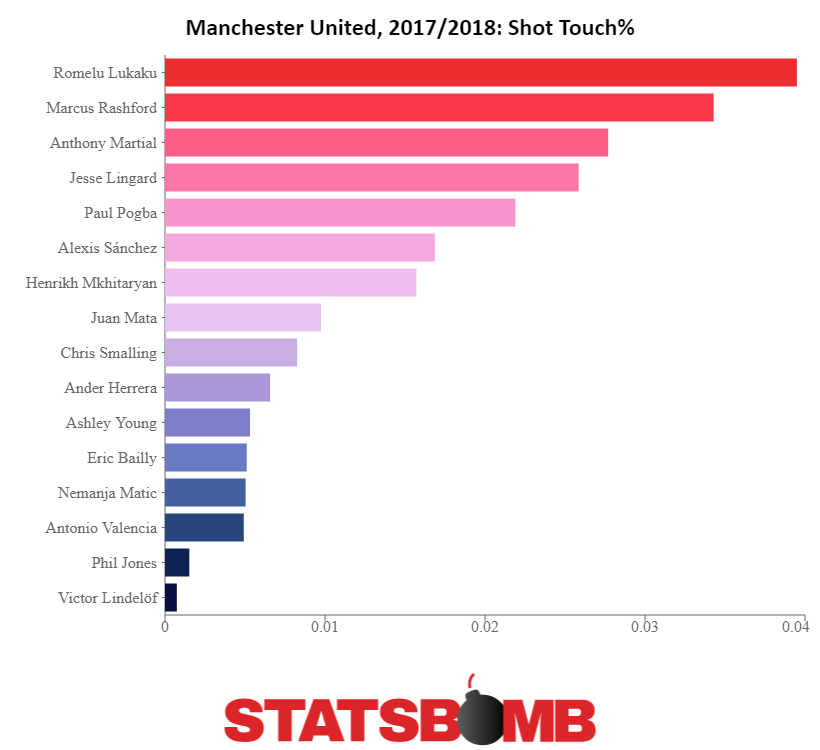
They might have been deployed on the wing, but both Martial and Rashford did their darndest to play like strikers. Sanchez on the other hand, was a much more focused distributor of the ball. He was a machine at picking up the ball, bringing it forward and passing it into the box.
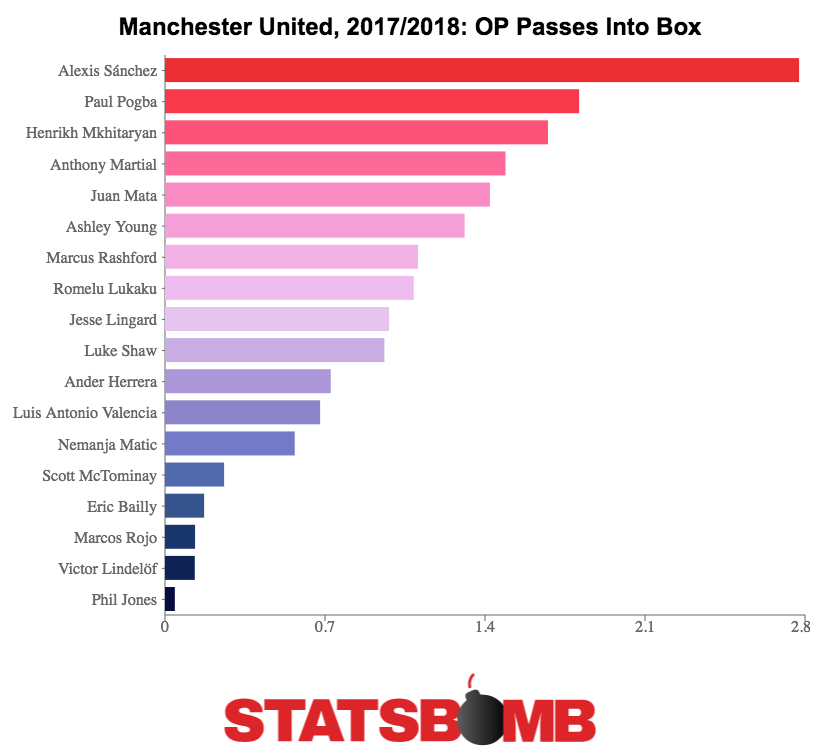
There’s nothing wrong with a wide forward being a facilitator, and in fact players that play that way are oftentimes powerful creative forces. But, changing the balance of United’s front line didn’t make them better. Instead, having Sanchez creating on the ball duplicated some of the skills already in the squad (you might remember the presence of a particularly impactful passer and ball mover named Paul Pogba) and left Lukaku ever more isolated as the major goal scoring force. This isn’t an unfixable problem. Sanchez is an extremely talented player who has at various points throughout his career shown skill both on and off the ball. He could adjust his game. Or, Mourinho could adjust the team so that while Sanchez continues to dominate the ball he has more players committed to attacking the box to aim for. However, that doesn’t seem to be what’s happening. Instead, Mourinho seems intent on cramming Sanchez into the hybrid role and Martial in response seems committed to trying to leave United. Rather than figure out how to get the best out of both Pogba and Sanchez’s passing, Mourinho spent the summer taking not so thinly veiled shots at the midfield star. These are real, existing, tactical issues that Mourinho needs to navigate, awkward imperfect overlaps between players skillsets that need to be negotiated. They’re not issues of focus or intent, or commitment, but rather tactical problems that need to be solved. That’s not to say that Mourinho can’t solve them. Because of his bombast and addiction to being a public troll at every opportunity, Mourinho often solves tactical problems under the rhetorical cover he gives himself by being a such a jerk in public. Then again, he also often blows up and gets himself fired when he can’t.
Transfers? What Transfers?
Well, there’s Fred. He’s probably a decent all-around midfielder from Shaktar Donetsk. It’s hard to say because he plays in Ukraine and only has a handful of influential Champions League matches a year, but still, lots of Shaktar players like Willian, Douglas Costa and Fernandinho have gone on to major success at the highest levels of the game. Shrug. Then there’s the teenage fullback Diogo Dalot. And then there’s….that’s it, that’s the entire list. There seems to be a fundamental disconnect going on behind the scenes at United. Management is happy to go chase super stars for Mourinho. Mourinho wants center backs. There’s still time to rectify the situation. United boss Ed Woodward could still blink, lose Daniel Levy’s game of chicken and pay Spurs' asking price for Alderweireld. Or, United could settle for Maguire who may or may not be good enough for what Mourinho needs. The concern, and it’s one that’s been amplified by Mourinho’s extreme Mourinho-ness while on preseason tour in America, is that the giant transfer vacuum is just prologue for a disastrous season and an early year three Mourinho exit. As it stands right now it’s easier to see Mourinho blaming the lack of spending during this window as he storms out the door leaving the rubble of a disastrous couple of months behind him than it is to see a team prepared to fix the problems it had last season and maintain a solid second place pace, let alone contend for titles. Manchester United were not as good as their record last season. There’s nothing about the summer so far that shows much indication that they’re on the road to improvement. Without some last minute transfer business, United will be going into the season with a highly combustible manager, nearing the end of his usual shelf life at most clubs who hasn’t been backed in the transfer window and who just spend a season failing to solve the major problems caused by an imperfect match of talent and tactics. That’s not exactly a recipe for a successful step forward.
Thank you for reading. More information about StatsBomb, and the rest of our season previews can be found here.